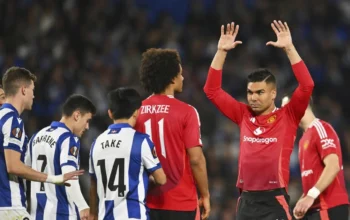Manchester United’s current woes have sparked a renewed debate: is Sir Alex Ferguson partly responsible for the club’s decline? The Red Devils are experiencing a dismal season, currently languishing in 14th place in the Premier League and facing an uphill battle to qualify for European competitions. Their recent FA Cup exit against Fulham, following a penalty shootout defeat, only amplified the sense of crisis.
The appointment of Ruben Amorim as manager, after Erik ten Hag’s dismissal last November, hasn’t yielded the desired results. Off the field, the situation isn’t much better. INEOS’s restructuring, including staff cuts and the departure of Sporting Director Dan Ashworth, points to a club struggling to find its footing. Even club legend Wayne Rooney deemed Amorim’s ambition to restore United to glory as “naive,” given their last Premier League triumph was a full 12 years ago, during Ferguson’s reign.
The criticism isn’t new. Pundits and former players alike are questioning the lasting impact of Ferguson’s departure in 2013. His exit, coupled with that of chief executive David Gill, reportedly left a gaping hole in the club’s structure. The argument hinges on the lack of a strong foundation left behind; a contrasting situation to Liverpool, which, despite a managerial change, remains strong thanks to the groundwork laid by Jurgen Klopp. This, according to some critics, is where Ferguson’s responsibility lies – a failure to build a sustainable, long-term model for success beyond his own tenure.
The accusation is that Ferguson failed to adapt to evolving coaching and recruitment strategies, creating long-term negative consequences. This lack of adaptation is seen as crucial to United’s inability to consistently compete with rivals like Manchester City and Liverpool since his retirement. The club’s struggle to produce homegrown talent, and a seeming inability to maintain a consistent winning formula, further fuels this critique.
The situation at Manchester United is complex, a tapestry woven with a multitude of factors. While Sir Alex Ferguson’s achievements are undeniable, the ongoing debate highlights the necessity of building a club structure resilient enough to weather managerial changes and sustain success long after a legendary figure’s departure. The question remains: Was Ferguson’s legacy more than just silverware, or is his shadow now a heavy burden on Manchester United’s future?
Manchester United’s current woes have sparked a renewed debate: is Sir Alex Ferguson partly responsible for the club’s decline? The Red Devils are experiencing a dismal season, currently languishing in 14th place in the Premier League and facing an uphill battle to qualify for European competitions. Their recent FA Cup exit against Fulham, following a penalty shootout defeat, only amplified the sense of crisis.
The appointment of Ruben Amorim as manager, after Erik ten Hag’s dismissal last November, hasn’t yielded the desired results. Off the field, the situation isn’t much better. INEOS’s restructuring, including staff cuts and the departure of Sporting Director Dan Ashworth, points to a club struggling to find its footing. Even club legend Wayne Rooney deemed Amorim’s ambition to restore United to glory as “naive,” given their last Premier League triumph was a full 12 years ago, during Ferguson’s reign.
The criticism isn’t new. Pundits and former players alike are questioning the lasting impact of Ferguson’s departure in 2013. His exit, coupled with that of chief executive David Gill, reportedly left a gaping hole in the club’s structure. The argument hinges on the lack of a strong foundation left behind; a contrasting situation to Liverpool, which, despite a managerial change, remains strong thanks to the groundwork laid by Jurgen Klopp. This, according to some critics, is where Ferguson’s responsibility lies – a failure to build a sustainable, long-term model for success beyond his own tenure.
The accusation is that Ferguson failed to adapt to evolving coaching and recruitment strategies, creating long-term negative consequences. This lack of adaptation is seen as crucial to United’s inability to consistently compete with rivals like Manchester City and Liverpool since his retirement. The club’s struggle to produce homegrown talent, and a seeming inability to maintain a consistent winning formula, further fuels this critique.
The situation at Manchester United is complex, a tapestry woven with a multitude of factors. While Sir Alex Ferguson’s achievements are undeniable, the ongoing debate highlights the necessity of building a club structure resilient enough to weather managerial changes and sustain success long after a legendary figure’s departure. The question remains: Was Ferguson’s legacy more than just silverware, or is his shadow now a heavy burden on Manchester United’s future?
Sumber : https://www.bola.com/inggris/read/5943693/lagi-sir-alex-ferguson-dituding-ikut-andil-kemerosotan-mu




















